- Home
- Mary Stewart
A Wlk in Wolf Wood
A Wlk in Wolf Wood Read online
A Fawcett Crest Book
Published by Ballantine Books
Copyright © 1980 by Mary Stewart
All rights reserved under International and Pan-American Copyright Conventions.
Published in the United States by Ballantine Books,
a division of Random House, Inc., New York.
ISBN 0-449-21422-2
This edition published by arrangement with William Morrow & Company, Inc.
Manufactured in the United States of America First Fawcett Crest Edition: August 1981
First Ballantine Books Edition: July 1982
Thirteenth Printing: December 1989
For Jason, Elinor, Jennifer and Charles
ABOUT THE AUTHOR
MARY STEWART one of the most popular novelists of all time, was born in Sunderland. County Durham, England. She received a B.A. with first class honours in English Language and Literature from Durham University and went on for her M.A. Later she returned to her own University as a Lecturer in English.
Mary Stewart's career as a novelist began in 1954 with the publication of "Madam, Will You Talk?" Since then she has published many successful novels, including the four books in her Arthurian Saga.
In 1968, she was elected Fellow of the Royal Society of the Arts.
CHAPTER ONE
John and Margaret Begbie were sitting on a rug beside a track through the Black Forest in Germany when a man walked past them, weeping bitterly.
The children and their parents had been having a picnic. They had left the car in a parking area beside the road, and, carrying the rug and the picnic things, walked back to where a wide track led steeply downwards from the road into the shade of the trees at the forest's edge. Between track and roadway was a wedge-shaped stretch of mossy grass, where an old, battered wooden signpost stood, and near it the mossed stump of an enormous tree. They spread the rug beside this, full in the sun. To their left the track led on steeply downhill, to vanish into the darkness of the forest. Ahead of them the trees grew more thinly, giving sunlit glimpses of the wooded valley below. A river ran there, and there, on its rocky hill, stood the ruined castle that the Begbie family had visited that morning. They could see, tiny in the distance, the narrow wooden bridge that spanned the dry moat, and the hut where they had bought tickets and postcards. Beyond the castle was the glint of water where the river ran. Beyond that again, and wherever the eye could travel, were trees, trees and more trees...
The forest was very quiet. The children's father, drowsing after the meal, lay full length beside them, asleep. Mrs. Begbie had gone back to the car; for her knitting, she said, but she had been gone so long that the children suspected that she, too, had dozed off in the sleepy heat of the afternoon. No cars had gone by; no one had passed that way at all, until the strange man came down the track from the roadway.
He walked quickly, head down, and, though he passed within a yard of them, took no notice at all of the two children and their father.
John and Margaret stared after him, surprised and disturbed. They had never seen a grown man cry before, and besides, this man did not seem to mind who saw or heard him.
His breathing shuddered, and he stumbled now and then as if his tears blinded him, but he made no attempt to wipe them away. They poured down his face and dripped onto the faded red velvet of his coat.
That was another strange thing about him: the way he was dressed. He was the wrong age, and looked the wrong kind of man, to be wearing the rather flamboyant costume he had on. A long tunic of crimson velvet-like a close-fitting coat–clothed him to the thighs. It was buttoned all down the front with gilded buttons, and girded low on the hips with a studded belt of worked leather. Below it he wore some kind of leggings, or hose, of faded grey-blue, and shoes of soft, scuffed-looking brown leather. Over it all went a cloak of the same grey-blue as the hose. This had a hood which had been pushed back to hang behind over his shoulders, like a collar. He went bareheaded. His clothes, odd though they were, gave the impression of once having been very good, and very expensive; but they were sadly shabby now.
"A knife, too." John spoke softly, so as not to wake Mr. Begbie. "Did you see? He had a long knife at his belt."
"Well, yes," said Margaret, "but it's just part of the costume, isn't it? Remember those dancers we watched the other evening at St. Johann, doing the local dances in peasant costume? The men were wearing knives like that. It won't be real. Not for use, I mean."
"I suppose not, but his clothes didn't look a bit like those peasant costumes. For one thing, they were sort of shabby, as if he wore them every day. As if he was used to them. The dancers we saw, well, they were just dressing up. You could tell," he finished, rather feebly.
"Could he be a forester, or something?"
"I don't know. Did you see the chain round his neck, with that big medallion thing on it? It looked like gold. Why would a forester–or anyone, come to that, who isn't a pop star–wear a thing like that?"
"Imitation, to go with the costume."
"But it wasn't costume. I told you–"
"Imitation, anyway," said Margaret decidedly. "It couldn't be gold, not a thing that size. It would be worth a fortune, and he didn't look rich."
"No, but he didn't look like a peasant, either," said John obstinately. "He reminded me of something, but I can't remember what. Whoever he was, he looked..." He paused again, searching for the right description, and failed to find it. "He looked so strange," was all he could think of. "Not just his clothes. Himself."
"He was crying, you mean," said Margaret.
"He didn't even see us. We might as well not have been here at all."
The children looked at one another. Beside them Mr. Begbie stirred in his sleep, but did not waken. It was very quiet. A wood pigeon flew out of the high treetops with a clap and flurry of wings. A jay screamed in the distance, and from time to time a wren flew down onto the ferns nearby, with a shrill, cross little song.
But otherwise the forest was still, with the heavy, sleepy stillness of summer.
Not that it was really silent. If you lay with your eyes shut, and really tried to listen to the silence, you could hear it; it was made up of thousands of tiny sounds which might be the trees growing, or the toadstools pushing up through the pine needles, or the air breathing gently through the twigs overhead as the sun heated the ground and the moisture drifted upwards from the mosses. Then there were the insects; under and over and through all the silence was a steady throbbing hum that was so much a part of the forest that it seemed to be inside the listener's brain, and not outside in the wood. It was made of the wingbeats of millions of tiny insects, gnats, bees, wasps, hover flies. The forest hummed silently, and the still air vibrated.
The children heard nothing of the immense secret life of the forest. They were still staring at one another, and, as sometimes happens with people who know each other very well, each of them sensed what the other was thinking.
"Something awful had happened to him,"whispered John. "Not just an accident, or getting hurt–and anyway there was no sign of that–but something really awful."
"Like having a wound, deep inside," said Margaret, "and bleeding to death slowly, but not telling anyone."
John, who was older, and perhaps less imaginative, looked doubtful, then nodded. It must be certainly true that the man was in some bad trouble, so bad that he seemed hardly to know what he was doing or where he was going. He had vanished into the shadows of the forest as if he had been a dream, or a ghost. But they could not get him out of their minds. It seemed wrong just to let him pass like that, and go his way to suffer alone, without even offering help.
Not, of course, that there was anything they could do. All the same...
"We could go j
ust a little way," suggested Margaret, "just to see where he was going."
She did not say why, and John did not question it. Neither of them could afterwards explain why it suddenly seemed so urgent that they should follow the stranger into the wood.
In the normal way they would have been thankful that he had not noticed them, and would have kept out of his way until he had recovered himself, but now a kind of compulsion seemed to seize them. Margaret was already on her feet.
John, though usually the more cautious of the two, hesitated only briefly before he followed suit.
"All right, but we ought to wake Daddy and tell him."
They thought about it for a moment or two.
Mr. Begbie was really very fast asleep indeed, and they remembered vividly the times when they had, by mistake, woken him up and met the blast of his wrath, and their mother's exasperated reasoning: "Your father works very hard and needs to rest. Leave him alone, now, children, do, and go and play quietly somewhere else..."
"I don't think we'd better," whispered Margaret. "At any rate, not until we're quite sure there's something wrong. They're always telling us not to disturb him when he's catching up on his sleep, and sending us away. And they did both tell us to go for a walk this afternoon."
"But not to go far."
"Well, it might not be far. And it'll be obvious which way we've gone. There's only the one track."
"Well, all right, but you know what we're supposed to do. We'll leave a note telling them where we've gone. Where's that pencil and pad you were drawing with?"
So, very sensibly, that was what they did.
John wrote: "Have gone down this track to explore. J and M." They put the note on the tree stump where the picnic basket stood, weighted it down with a comer of the basket, and then, very quietly, so as not to rouse Mr. Begbie, they tiptoed past the sleeping figure on the rug, and followed the track downhill into the forest.
CHAPTER TWO
The track led fairly steeply downhill for some distance, then levelled out as it curved deeper into the forest. Here the trees crowded more closely together, immensely tall, each one trying to push up beyond the others to reach the light.
There were no oaks or beeches any more, no brambles and ferns and harebells beside the track; only the smooth, straight trunks of the pines, like pillars holding up the black thatch of boughs that shut out the sunshine as effectively as a roof. Even the floor of the forest grew no more moss, but it did grow things more colourful and more exciting. Everywhere among the tree roots and thick fallen needles were clusters of toadstools. White eggs pushed up to become weird-looking stinkhorns; brown balls opened out into bronze and lilac wood blewits; and here and there, looking like illustrations to a story about Elfland, were scarlet caps spotted with white, the poisonous fly agarics.
"Don't touch them," warned John, as his sister stopped to look closer.
"I'm not going to! It's funny, isn't it, how these are always the ones in the storybooks, with gnomes and things sitting on them? Just because they're so pretty, I suppose, but really when you look closely at some of the others, they're just as pretty. Hey, John."
"What?"
"Ought we to go back now? We seem to have been walking for ages, and there's no sign of him."
"Perhaps we ought. Look, there's a tree lying across the track at that bend there. Let's just go as far as that."
The tree he spoke of was a huge, fallen pine which lay some distance off, clear across the way. They ran towards it. Beyond the fallen trunk the track seemed to plunge even deeper into the forest. It was like a black tunnel between black pillars.
John kicked at the dead twigs and broken stuff that lay under the trunk. "He must have come this way. It's the only path. He'd have an awful job to make his way round all this–oh, no, here's where he climbed over. There's a footmark in the soft stuff, and–did he have a dog with him? I didn't see one."
"Nor did I." Margaret came to his elbow, peering. There was the footmark, deep and distinct in the soft earth, and another, a pace from it, less distinct. With these, equally clear, were pawprints, big ones, even bigger than the prints that Tray made. Tray was their dog, who had had to be left at home. He was an Alsatian.
"Then it's probably a wolf," said John cheerfully. He grabbed at a branch above his head, and began to clamber up onto the fallen trunk.
"Yes, he got over here, there's some mud on the trunk. There ought to be wolves here, of course! Perhaps that's why he carried the long knife."
Margaret looked round her uneasily. She knew quite well that John was joking, but somehow, in this enormous, dark and silent forest, the idea of wolves did not seem strange at all. "What do you mean, there ought to be?"
John, balancing on the tree trunk, grinned down at her. "Don't you remember, when Daddy was planning the picnic, they were looking at the map, and he said that this wood was called Wolfenwald?"
Margaret looked blank, because, though the name Wolfenwald looks very like "wolf" when you see it written on a map, it is actually pronounced, in German, "Volfenvalt."
"Well," she began, "I don't see–"
"It means Wolf Wood," said John flatly.
"Oh."
"It said it on the signpost, too. Didn't you notice?"
"No."
"So he'd have to carry a knife."
"But if there really are wolves here," said Margaret reasonably, "why not a gun?"
"With that costume? A bow and arrow would suit it better! I've remembered what he reminded me of now. It's– Here, hang on a minute!" John stopped abruptly, and began to scramble down on the far side of the tree.
"What is it?"
"Look, Meg, can you get over? Come and see. It's all right, I was only joking about the wolves. Only, can you get across, quickly?"
Margaret soon clambered up after him, and dropped down on the other side of the tree trunk.
John was standing among the welter of fallen branches. He pointed down among them. She looked. There, shining among the broken stuff and dead pine needles, was a big gold medal and a tumble of gold chain.
She found herself speaking in a whisper.
"When he climbed over the tree trunk, it must have caught on something, and with him crying like that–"
"He wouldn't have even noticed when he lost it," finished John. He stooped and picked the thing up, balancing it in his hand. "It's pretty heavy, it could have swung forward as he bent over, and slipped off somehow. See, the chain's not broken or anything."
"What's on the medal?"
John held it out on his palm. The children looked at it. It shone so brightly that, even in the dim light of the forest, they could see it quite clearly. It was like a big coin. In the centre was a man's head, a young face, in profile, with hair down to the shoulders. He wore a narrow circlet, like a crown. Below the portrait was what seemed to be a name: OTHO. They turned the medallion over. Across the back was the single word FIDELIS.
"The man we saw wasn't Otho," said John. "He's quite different, and older anyway. Fidelis is Latin, I do know that. It's in our school motto. It means 'faithful.'"
Margaret fingered the chain. It was beautifully made, heavy but flexible, each link finely engraved. "I think it's real," she said, awed. "Real gold. It's so heavy. Gold's heavy, isn't it? I know Mummy's gold bracelet weighs an awful lot."
John balanced the thing again in his hand. "It is heavy, yes. If it's real–" He looked round him at the silent forest, at the track vanishing round a curve into darkness.
"If it's real," said Margaret, "it's terribly valuable. But even if it isn't, he'll want it back. Perhaps we ought to go on and try to catch him up?"
John nodded. "He's probably missed it by now, anyway, and he'll be on his way back. We'll go just a bit farther. We can't very well leave it here, hanging from the tree. If it is real, then anybody could pick it up, or anything. Jays take shiny things, don't they, and magpies? I did hear a jay farther back in the wood."
"All right. But let's run, shall we
? It–it's beginning to get dark."
"That's only because the trees are so thick here. It's hours still till sunset. Don't worry. We'll just go as far as that bend, and if we don't see him coming back we'll go back ourselves."
"And the medal?" asked Margaret.
"We'll give it to Daddy. He'll know what to do. Leave it with the police, or something. Come on, then."
They ran on. The bend, when they got to it, wasn't really a bend, just a curve, with another bend beyond that. And another... The track narrowed, twisting deeper between the trees.
Roots webbed the paths, like snares made of rope. It was certainly growing darker. Margaret tripped, saved herself, and stopped. John had not noticed. Running slightly ahead of her, he was already out of sight.
"John! John! Let's go back now!"
Silence. She realized, suddenly, that she could no longer hear her brother's footsteps.
But before she had time to feel scared, she heard him calling. "Meg! Here it is! It's all right, there's a house here! Come and see!"
She ran to catch up with him. He was waiting for her in a patch of rosy sunlight that shone through a gap in the trees, like a spotlight on a dark stage. The gap was to the right of the track. There, down between the trunks, a little path curved towards a clearing, where the sun, pouring in, had allowed mosses to grow, and ferns, and brambles and even flowers. And some of the flowers were garden ones; gone a bit wild, perhaps, as the garden had.
For there were, indeed, the remains of a garden. It lay around a small cottage, so small, so mossed and weed-grown, with walls and thatch so exactly the colour of the forest, and merging with the fading light, that it was a marvel they had seen it at all.
"I'll bet that's his house," said John. "He was just on his way home."
"And a fine old welcome he'd get!" said his sister. "Just look at it! Those aren't curtains at that window, they're cobwebs, and the door's not been opened for years!"

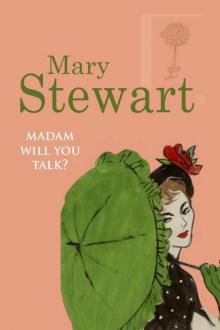 Madam, Will You Talk?
Madam, Will You Talk?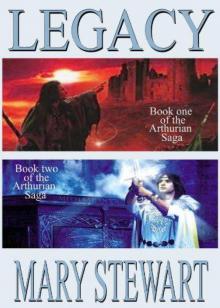 Legacy: Arthurian Saga 1-4
Legacy: Arthurian Saga 1-4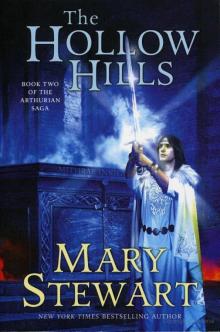 The Hollow Hills
The Hollow Hills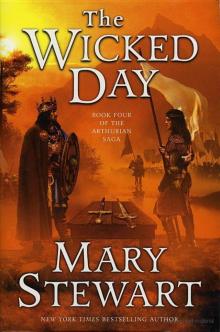 The Wicked Day
The Wicked Day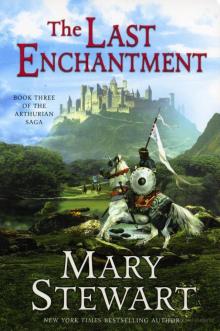 The Last Enchantment
The Last Enchantment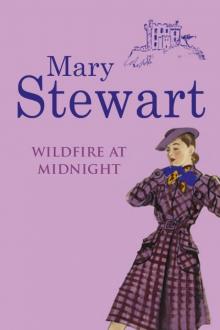 Wildfire at Midnight
Wildfire at Midnight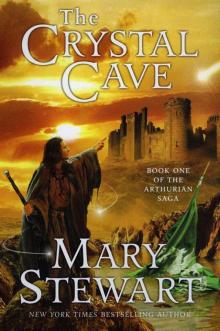 The Crystal Cave
The Crystal Cave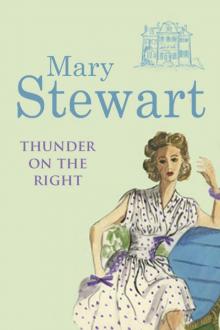 Thunder on the Right
Thunder on the Right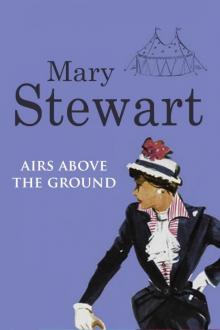 Airs Above the Ground
Airs Above the Ground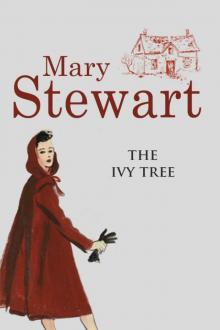 The Ivy Tree
The Ivy Tree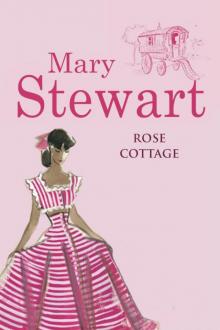 Rose Cottage
Rose Cottage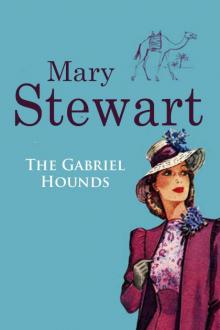 The Gabriel Hounds
The Gabriel Hounds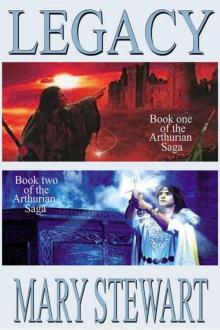 Legacy: Arthurian Saga
Legacy: Arthurian Saga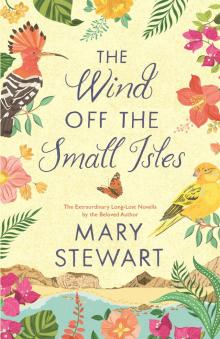 The Wind Off the Small Isles
The Wind Off the Small Isles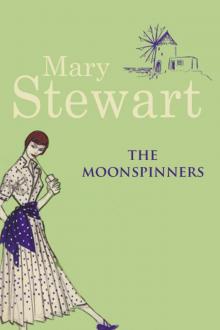 The Moonspinners
The Moonspinners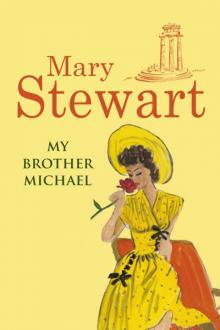 My Brother Michael
My Brother Michael The Prince and the Pilgrim
The Prince and the Pilgrim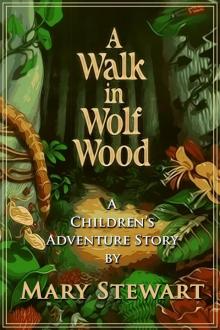 A Wlk in Wolf Wood
A Wlk in Wolf Wood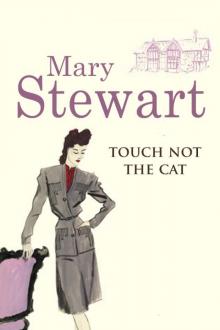 Touch Not the Cat
Touch Not the Cat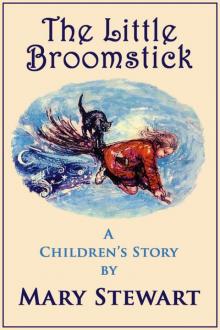 The Little Broomstick
The Little Broomstick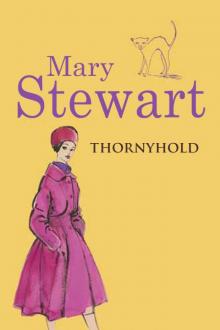 Thornyhold
Thornyhold This Rough Magic
This Rough Magic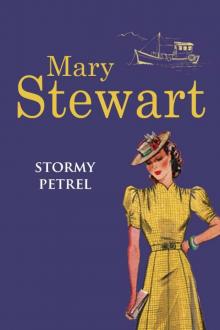 The Stormy Petrel
The Stormy Petrel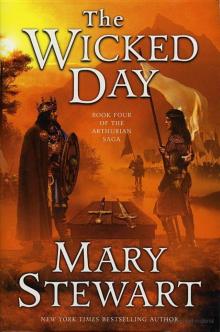 Wicked Day
Wicked Day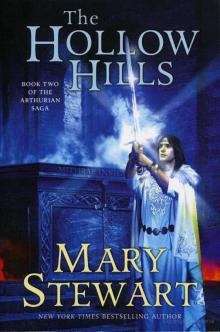 Hollow Hills
Hollow Hills WILDFIRE
WILDFIRE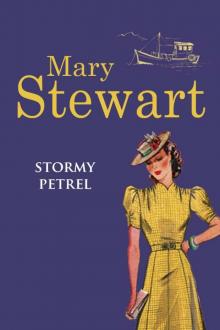 Stormy Petrel
Stormy Petrel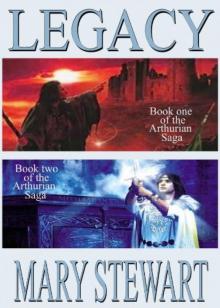 Legacy
Legacy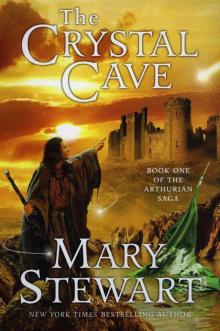 Crystal Cave
Crystal Cave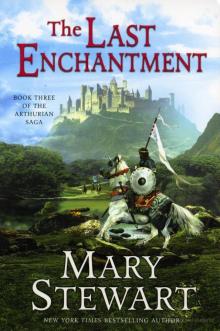 Last Enchantment
Last Enchantment